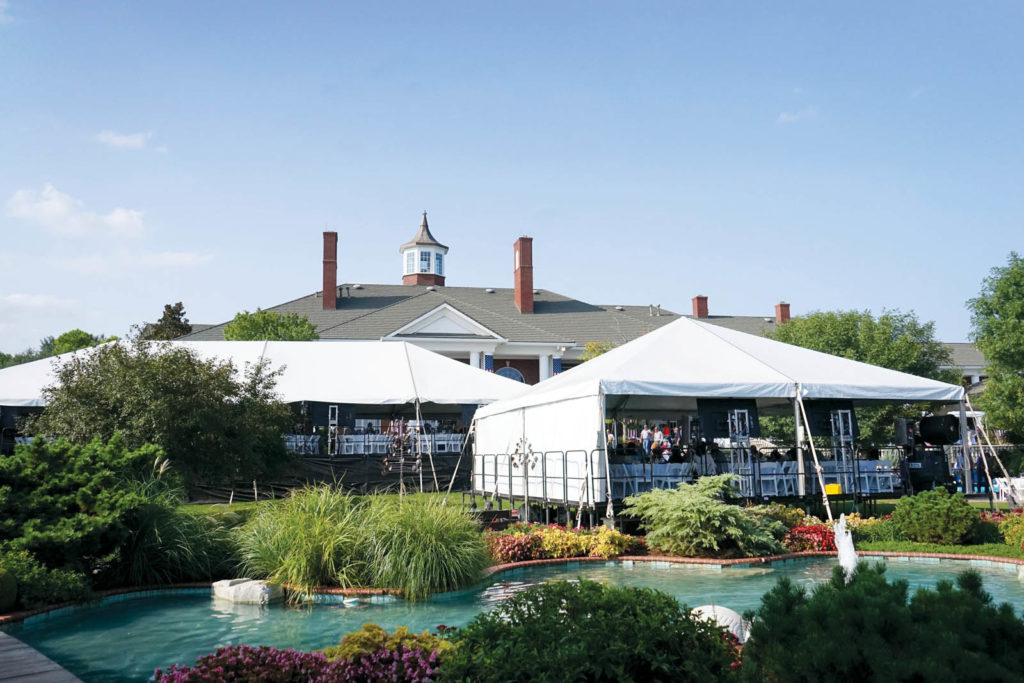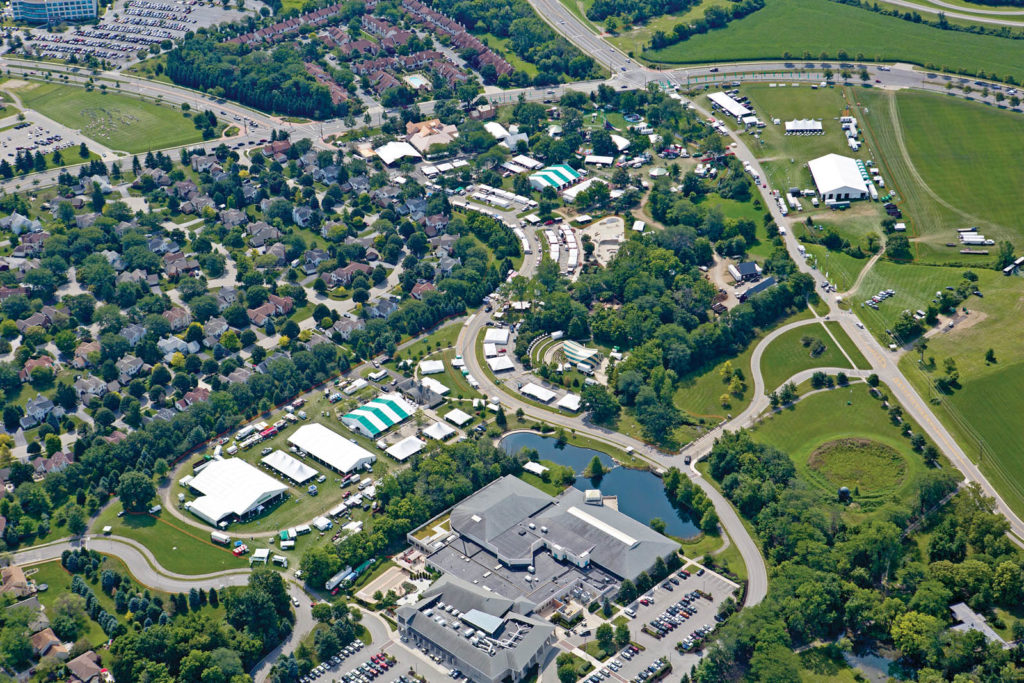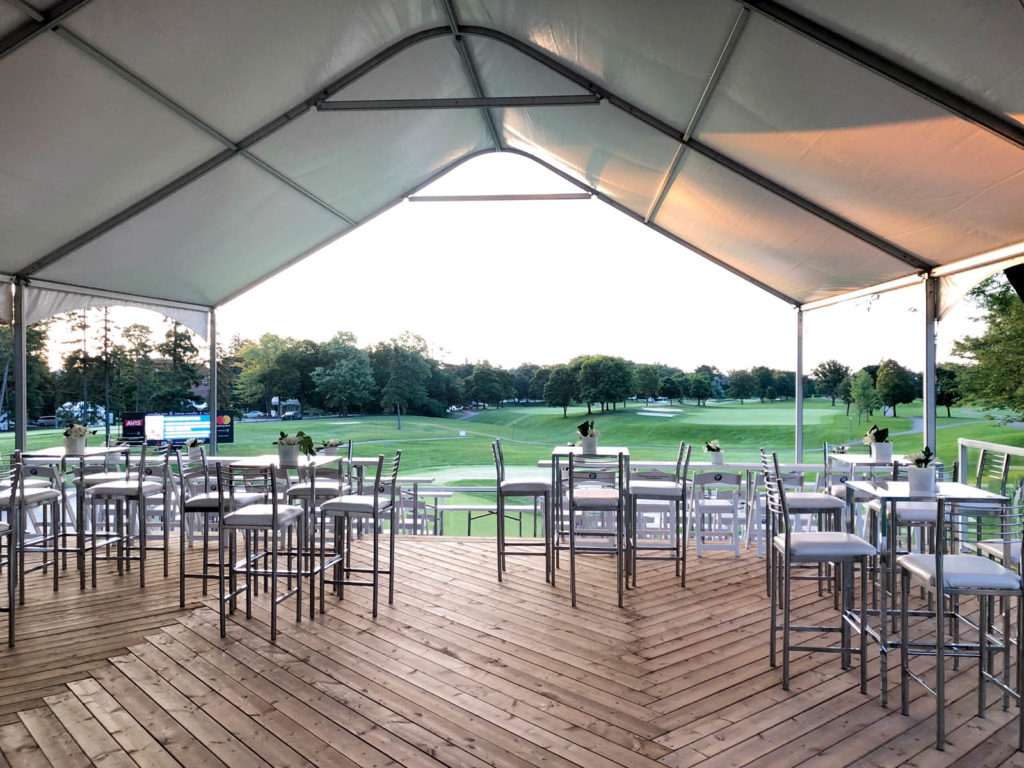Tent rental professionals share their advice for smooth sailing through the busy season.
by Holly O’Dell

In the second week of August 2018, Premier Event Tent Rentals Inc. of Brampton, Ontario, Canada, was involved in the dismantle of the RBC Canadian Open in Oakville, Ontario; the setup of the Shaw Charity Classic golf tournament in Calgary, Alberta; the CP Women’s Open in Regina, Saskatchewan; a large wedding setup in Toronto, Ontario; and ongoing smaller local jobs.
“Coping with these challenges required trusting the great people in our organization, who were spread out around the country, to each do their own part to contribute to our success,” says Paul Ussher, Premier Event director of operations. “It was important for each person to focus only on their part doing well. Because of this, we were able to get through the week successfully.”
The high season for tent and party rental can be fraught with challenges. Production meetings fall by the wayside. Employees pay less attention to details. Warehouses become disorganized. Exhausted laborers start to show signs of fatigue. Bad weather can strike, upending already tight delivery and installation schedules.
With the proper preparation, however, event rental companies can ease the burdens associated with the high season. Read on for advice from tent rental professionals on best practices and surefire strategies to tolerate—and maybe even enjoy—the busiest weeks of the year.

Check the calendar
In spring, summer and fall, tent rental companies in most of the United States and Canada are flooded with business. However, different regions experience nuances in that timeline. For example, Marianne’s Rentals for Special Events in Oklahoma City, Okla., has two high seasons: one from late April through mid-July, and the second from late August through mid-November.
“The market for fall weddings has really picked up over the last few years,” says Jennifer Rodriguez, general manager of Marianne’s Rentals. “September and October are also festival season and college football. We also have one or two super-large events that fall during that time.”
For O’Neil Tents in Canal Winchester, Ohio, the biggest need for labor occurs from mid-May to mid-June for a variety of events, including graduations and weddings, and September, when events are fewer but larger.
“The first two weeks of September are our busiest because we are installing a large quantity of clearspan plus accompanying smaller tents,” says company president Brian Ritchey. “We are also traveling out of our normal geographic area at that time.”

In Canada, Premier Event Tent Rentals has a somewhat shorter busy season, running from May to the end of September. To manage a mix of large projects and ongoing routine work, the company relies on an all-hands-on-deck approach. “This may mean sales staff assisting in an operational capacity, or our operational staff helping with the warehouse,” Ussher says.
Saying no to a job that falls during a busy period or is a bad fit for your company can go a long way to maintaining a high level of customer care for the clients you want to keep coming back. “We try to focus on the most profitable events during our busy season, especially in June and September here in Chicago,” says Dave Cesar, president of Blue Peak Tents Inc. of Batavia, Ill. “The goal is always to have fewer events per week with higher gross margin per event.
“You have to limit your events to your capabilities,” he continues. “I see so many companies that can’t say no, and we say no to a lot of events.”
Above all, good communication with customers is critical to managing the busy season. “We slow down and double-check our work to avoid errors,” says Darcy Van Gorp, president of ABC Rentals in Sioux Falls, S.D. “We engage with our customers when making deliveries and doing setups and make sure they are completely satisfied before we leave the site.”

Show you care
A reliable labor force is critical to a successful busy season. Marianne’s Rentals prefers year-round employees, but the company does have positions to fill before the busy season hits. The company has found quality workers through hiring events and has offered employees a $100 bonus for referring anyone who stays on for six months.
When another company suggested to Cesar several years ago that he hire a human resources manager for Blue Peak, he balked because he didn’t have the salary in his budget. But he did it anyway, and he has never questioned his decision, he says. Although the HR manager handles many administrative tasks, “their sole responsibility before our busy season is to recruit, recruit, recruit,” he says. “We have 125 seasonal workers come and go throughout the year, and keeping tabs on all those people and the paperwork associated with it is no small task.”
Given the stress that the busy season can induce, tent rental company owners, managers and crew chiefs should be aware of the signs of employee burnout. “It’s important to recognize what they are going through and that you appreciate the hard work,” says Mike Holland, president of Chattanooga Tent & Event Solutions, Chattanooga, Tenn. “It is equally important to be selective of the work that may be adding the additional hours. Sometimes the revenue is not worth the added stress.”

Van Gorp aims for a close-knit workforce. “We try to have fun on the job and work together like a family on and off the job,” he says. This includes things like free meals or social hour.
The approach pays off. “We have called on former employees who will take time off their current jobs to fill in,” Van Gorp says. “We’ve even called on family to help with tasks like washing dishes.”
When it comes to time-off requests, most tent rental companies have a similar policy during the busy season. “Planned vacations are rarely taken,” Ritchey says. “Time off during the season is generally only for good reason, and we look at requests on a case-by-case basis.”
Bumps in the road
When Marianne’s Rentals landed the contract for home football games at the University of Oklahoma, providing rentals for the alumni department, football department, booster club and the head coach at his home, the rental company planned extremely detailed logistics and held weekly production meetings leading up to the season. “There is a huge amount of activities that happen on game day, and the school wants everything in and out quickly,” Rodriguez says. “Although we faced a few bumps along the way, this job went well, and we are better prepared for another season with
the university.”
Even tent rental companies that are well prepared for their busiest weeks will encounter a few bumps in the road. “Often in the rush of having a lot of things to do, it can become tempting to not pay attention to the details,” says Ussher. For example, someone rushing to prepare numerous orders may miss a few components.

“This type of an error is very costly and compounds this issue as an already busy week becomes busier trying to fix mistakes,” Ussher says. “The time and expense to fix the mistake far outweighs the marginal extra cost to check that it was done right the first time.”
One of the biggest busy season challenges that Blue Peak has overcome is warehouse organization. To keep warehouse aisles and docks clean throughout the year, the company hired dedicated warehouse staff tasked with the sole responsibility each day to put equipment back in its rightful spot after it’s unloaded from trucks.
“If this doesn’t get done daily, then items will start to pile up in aisles and around docks, equipment will start to get buried, and ultimately it just becomes a chaotic mess,” Cesar says. “This is often an under-the-radar task that goes a long way toward crew and event efficiency.”
Adds Rodriguez: “We work hard to make sure that damaged equipment is taken out of the inventory when it’s busy so that we don’t overbook or rent something that’s broken.”
No matter the challenges a tent rental company must navigate, providing a great customer experience always takes priority. “Starting on their first day, we instill in each employee that we are here to create a quality customer experience,” Holland says. “Customers need to feel that they are important. We only have one chance to make a memory for them, and it needs to be outstanding.”
Holly O’Dell is a freelance writer and editor based in Palm Desert, Calif.
 One trick to managing obstacles and staying organized during the busy season is to maximize the features of your rental management software.
One trick to managing obstacles and staying organized during the busy season is to maximize the features of your rental management software.
For example, Party Track Rental Software’s “busy calendar” function allows users to determine how many orders have to be delivered or picked up, how many trucks need to be scheduled, and how many items are on the orders. “If a day is too busy, you can easily select orders to be delivered or picked up on different days,” says Larry Weeman of Party Track, based in Clermont, Fla. “You can also mark any day as busy, which provides a warning to order takers to select different delivery or
pick-up days.”
Point of Rental Software dispatching solutions with GPS integrations allow tent installation crews to get to jobsites as efficiently as possible and for the office to know where everyone is, says Brian Beaudry of Point of Rental Software, Grand Prairie, Texas.
Point of Rental Software also lets users see reservations in future weeks so they can plan their staffing and fleet accordingly. As the busy season hits, the real-time processing capabilities of the various modules, from fulfillment to dispatch to mobile apps, “help reduce or eliminate costly gaps in communication that can result in unhappy customers and wasted time,” Beaudry says.
Then, after the busy season, the reporting features provide data on reservations, overbookings and missed rentals to help guide inventory decisions for next year’s busy season.
The nature of seasonal work means long days, many of which are spent in heat and humidity. Avoid worker burnout with one or more of these suggestions:
- Offer bonuses to employees for working outside of your main business hours or at the end of the season.
- Buy meals for employees.
- Provide plenty of water and Gatorade.
- Host a party or cookout for employees and their families. For a more formal event, cater a holiday celebration.
 TEXTILES.ORG
TEXTILES.ORG


